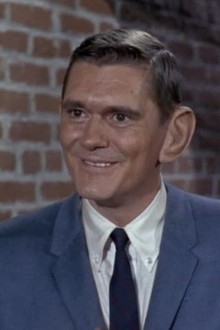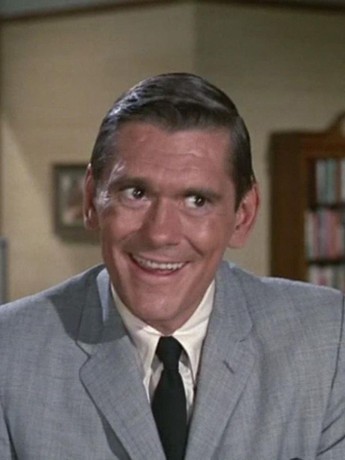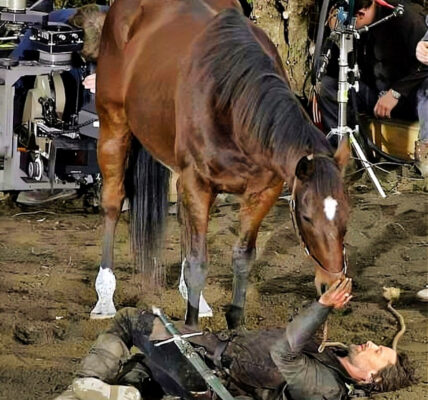On a warm afternoon in the mid-1960s, the set of Bewitched was alive with laughter. Lights burned bright, cameras rolled, and America’s favorite magical couple — Samantha and Darrin Stephens — rehearsed yet another scene of domestic chaos. The crew was used to laughter. But that day, the laughter stopped.
Without warning, actor Dick York — Darrin himself — clutched his back, his face drained of color, and collapsed to the studio floor. For a moment, everyone froze. The director shouted to cut. A microphone clattered to the ground. Someone rushed forward.

It looked like exhaustion. It wasn’t.
It was the moment when years of hidden pain finally caught up with him.
A Star Born in Shadows
To millions, Dick York was the charming everyman — the bewildered husband trying to live a normal life with a witch for a wife. He made the world laugh nightly, but behind his warm smile was a man fighting a silent war that no spell could fix.
That battle began long before Bewitched ever aired. In 1959, York was filming They Came to Cordura alongside Gary Cooper. During one scene, he helped lift a stack of heavy railroad ties. The others dropped theirs too soon. York didn’t.
“I heard something snap,” he would later recall.
The weight tore through his spine like lightning. He fell to the ground, gasping, as the world dimmed around him. Doctors told him it was only a pulled muscle. But it was far worse — a permanent spinal injury that would haunt every step, every breath, every performance that followed.
He was in his early 30s, at the height of his career. But from that day forward, his life became a quiet balancing act between fame and agony.
The Smile That Hid the Pain

By 1964, York had been cast as Darrin Stephens — the everyman husband in Bewitched, a role that would make him a household name. The job came with laughs, fans, and a steady paycheck — all the things he needed to keep going.
But every day was a war.
He’d wake before dawn, swallow a handful of painkillers, and practice breathing through the fire in his back. On set, he leaned against walls between takes, trying to steady himself while makeup artists powdered the sweat from his face.
And when the cameras rolled — he transformed.
He smiled. He quipped. He made magic believable. “If I didn’t work,” he said later, “I didn’t eat. So I worked — and I smiled through hell.”
Yet behind that grin was a man pushing himself beyond human limits. Sometimes, he’d be so stiff from pain he couldn’t rise from his chair. Other times, he’d collapse silently, too proud to call for help. Crew members whispered about his “bad back,” but only a few knew how bad it really was.
Every laugh track, every sparkle of magic, came at the cost of agony.
The Day the Curtain Fell

By the show’s third season, York’s body began to surrender. He was collapsing more often, missing lines, struggling to breathe through pain that no medicine could numb.
Then, during one scene, he tried to stand — and couldn’t.
“It felt like lightning hit me,” he recalled. The pain tore through him, blinding and absolute. The cameras stopped. Crew members rushed forward, lifting him gently as he trembled, pale and sweating.
That day was his last on Bewitched.
He was taken to the hospital, but he never returned to the set. ABC quietly replaced him without explanation. One week, viewers saw Dick York as Darrin Stephens. The next, a new actor — Dick Sargent — appeared, as though nothing had changed.
But everything had changed.
“I disappeared from their living rooms,” York said softly years later. “And from my own life.”

The Long Road Down
He was only forty. Out of work, in constant pain, addicted to the painkillers that had once helped him survive. Hollywood stopped calling. Studios moved on.
He sold his home, moved his wife and five children into a small trailer, and tried to make sense of a life that had suddenly shrunk.
“We had love,” he said, “and a mountain of bills.”
The man who had once made America laugh was now just trying to make it to the next day.
But through it all, he refused to turn bitter. He fought his way off the pills, one unbearable day at a time. He began to accept that fame wasn’t the purpose of his life — love was.
“Pain teaches you what really matters,” he said. “If you can’t move your body, move your heart.”
The Man Who Wouldn’t Stop Giving

As the years passed, his health continued to decline. Chronic pain became compounded by emphysema, the price of decades of smoking on set. Most days, he couldn’t walk far. Some days, he couldn’t even stand.
But lying there in bed, Dick York found a new way to act — not on screen, but in life itself.
He began volunteering for a charity that helped the homeless, making phone calls from his bedside. Later, he founded Acting for Life, an organization dedicated to raising funds for people in need. His bed became his office, his voice his instrument.
“I couldn’t walk far,” he said, “but my voice could still travel.”
Hour after hour, he called donors, wrote letters, and encouraged others to help. He refused pity. When asked if he missed Hollywood, he smiled. “I miss standing,” he said. “But I don’t miss pretending.”
Even as his body grew weaker, his spirit only grew stronger.
A Different Kind of Stage

Neighbors remembered the sound of his laughter drifting from his small home. His wife, Joan, called him “the gentlest soul who ever lived.”
To visitors, he’d offer warmth and humor — even when every breath hurt. “He’d joke that he had a bad back and worse timing,” one friend said. “But he meant it kindly. He just refused to live angry.”
In his final years, the man who once stood under studio lights learned to shine in a different way — through kindness, humility, and quiet grace.
“People think pain destroys you,” he once said. “But it can also strip away everything that doesn’t matter — until all that’s left is love.”
His Final Scene
By the early 1990s, York’s health had declined sharply. Emphysema made every breath a struggle. Yet, even then, he kept working for his charity, whispering through oxygen tubes to encourage volunteers.
Reporters came now and then, curious about the fallen star. He never complained. In his final interview, he said softly:
“You can’t live angry. Pain steals enough from you — don’t give it your soul too.”
On February 20, 1992, Dick York passed away in his Michigan home. He was 63.
There were no headlines. No flashing cameras. Just quiet — and love.
A Legacy Beyond the Screen
For most of America, Dick York was a memory — the man who vanished from their televisions without explanation. But for those who knew his story, he was something far greater.
He was proof that strength isn’t about standing tall — it’s about standing true.
He fell once — and never stopped rising.
His legacy wasn’t measured in episodes or fame, but in the kindness he left behind. From a hospital bed, he built a bridge between hearts. From a broken spine, he lifted others higher than he ever stood himself.
The world remembers him as Darrin Stephens — the gentle husband caught between love and magic.
But the real magic was never Samantha’s spells.
It was the quiet resilience of the man behind the smile — the one who kept shining long after the spotlight went out.
Because even when his body failed, his heart never did.
And that, perhaps, is the greatest kind of bewitchment there is — the power of one soul’s goodness to live on, long after the laughter fades.




